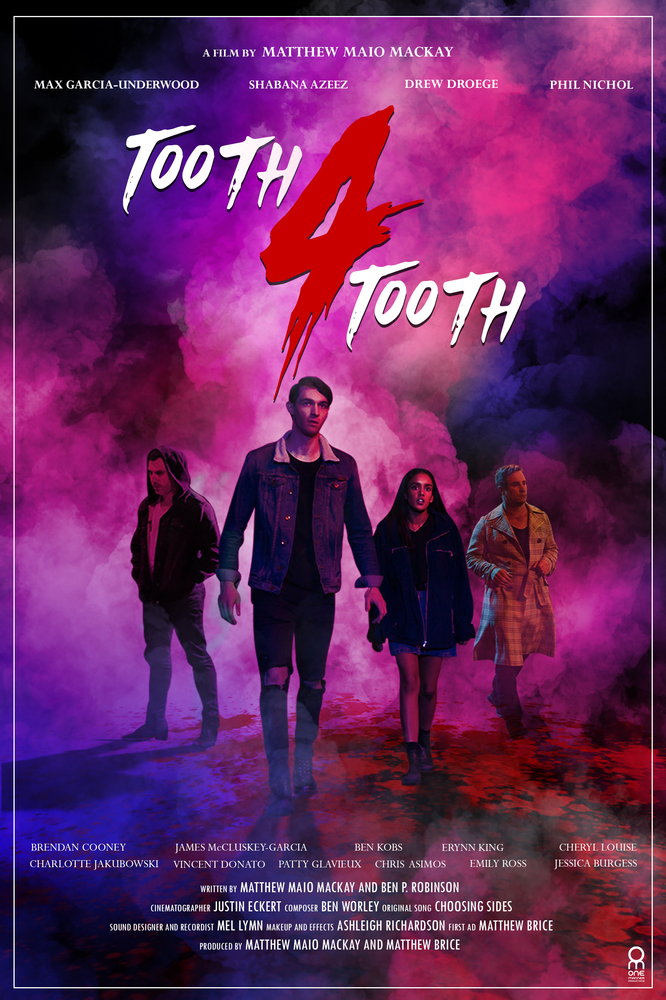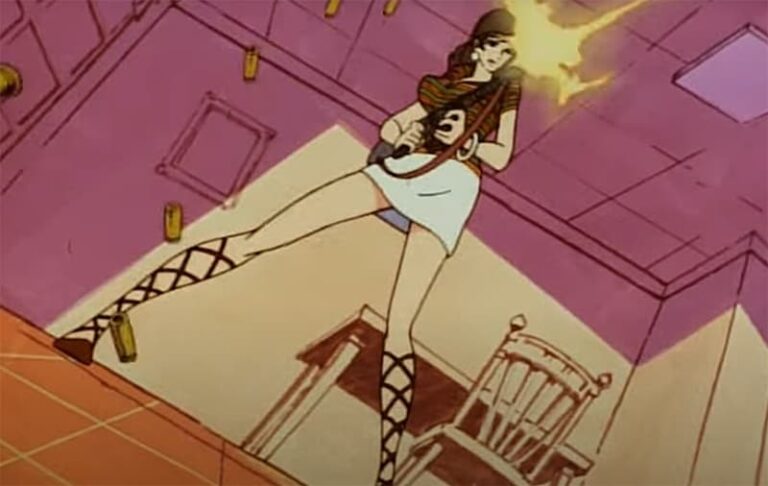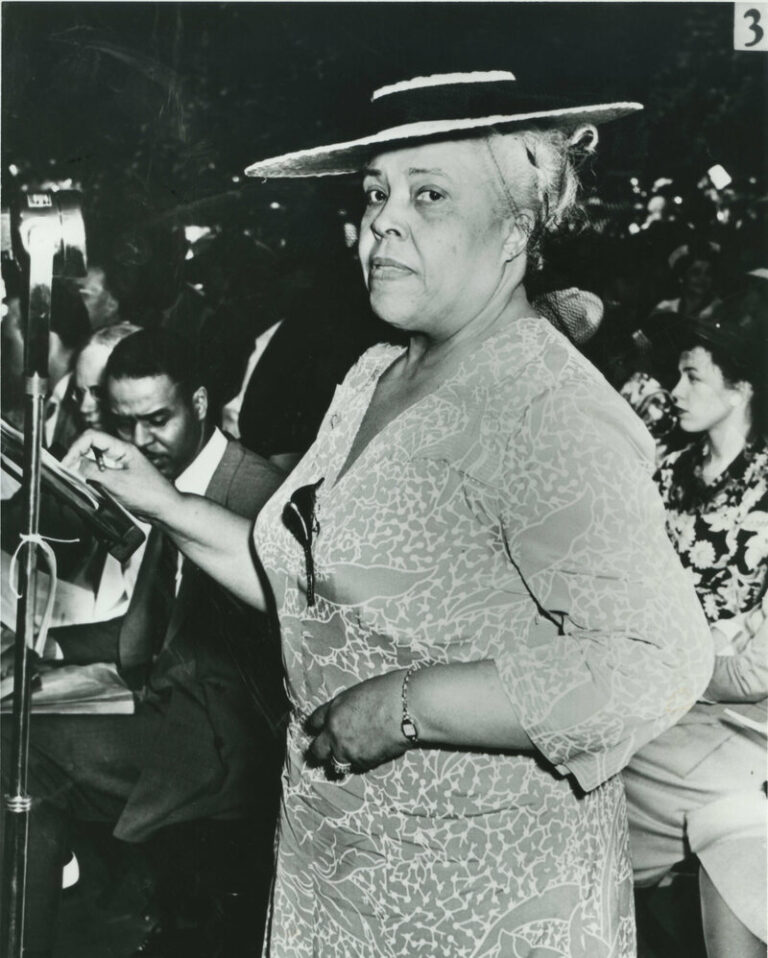The Dark Side of Harrison Ford: On the Roles That Led to What Lies Beneath
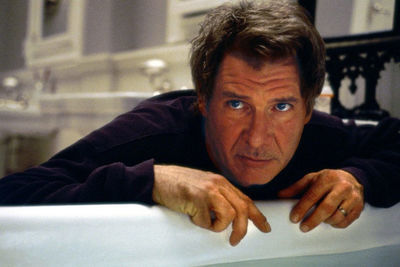
Twenty years ago, Harrison Ford played a murderous villain in Robert Zemeckis’ gaslighting supernatural thriller “What Lies Beneath.” The success of Ford’s performance as the manipulative Dr. Norman Spencer hinged on viewers’ expectations of his two most common character types: The upright father figure seen in projects like “The Mosquito Coast,” “Patriot Games,” and “Air Force One”—who ironically had a habit of leading his family into danger—and the righteous hero redefined forever byIndiana Jones and Han Solo. These characters leaned into Ford’s beguiling, yet determined aura, and sometimes mixed campy comedy with action-packed set pieces. They created an expectation, a trust, in ‘Harrison Ford the Movie Star’ to elicit certain virtues, to extol integrity. As Miles Surrey records in The Ringer, “What Lies Beneath” is the actor’s sole villainous turn.
But Ford often subverted his on-screen heroic reputation to provoke suspense in other dark, sometimes underrated roles. “What Lies Beneath” worked not only because of defied expectations but because of how it built on other examples of when Han Solo went bad.
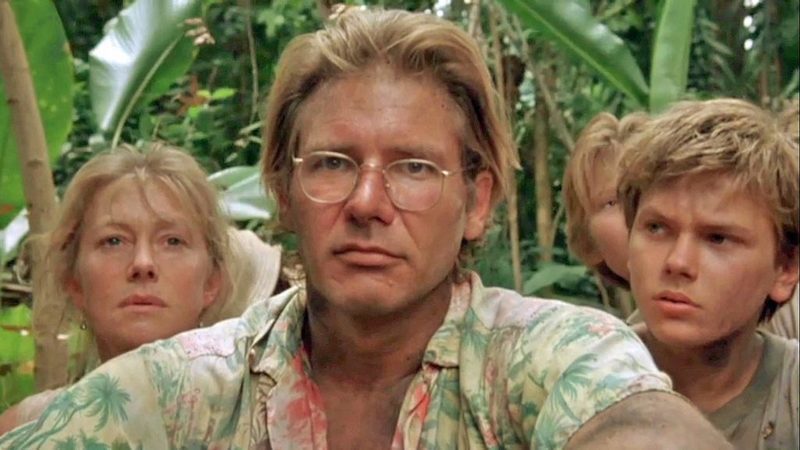
Take 1986’s “The Mosquito Coast.” After Ford’s first collaboration with Peter Weir, “Witness,” where he played an undercover detective hiding a child witness in Amish Country, audiences might have expected more of the same. In Weir’s “The Mosquito Coast,” the misunderstood inventor Allie Fox (Ford) uproots his family from their rural American surroundings to establish a utopian civilization in the small Central American village of Jeronimo. Initially, Allie’s two sons—Charlie (River Phoenix) and Jerry (Jadrien Steele)—treat their patronizing father as a godlike genius. They and their mother (Helen Mirren) take Allie’s harangues about the American Dream being shattered by consumerism, religion, and small minds as gospel. And when they depart their safe country environment to unknown jungles, they treat the journey as though it were a vacation. Heck, Allie is even wearing a Hawaiian shirt on their boat ride.
Their idyllic vision of Allie is shattered upon arriving in Jeronimo. He puts the natives into hard labor to tame the land and build his grand invention, a giant ice machine nicknamed “Fat Boy.” Allie’s decision to build a utopia in the jungle isn’t so much derived from a respect for the native’s way of life. Instead, it’s his white man’s burden to revolutionize their culture. Later, when his plan for an advanced civilization inevitably comes to ruin, the once eccentric yet idealist father turns malicious. Allie refers to his loyal black friend Mr. Haddy (Conrad Roberts) as a savage. Allie forces his devoted family to continue living in the jungle, even though they’re quickly losing food and shelter. In fact, Allie demands absolute fealty from his children lest they suffer his wrath. Thereby turning this once dreamlike land into a raging dystopia.
Due to his enacting several spiteful punishments, his sons turn on him. And when rebel warriors arrive with guns to establish Jeronimo as their base, in an attempt to freeze them to death, Allie traps the soldiers in Fat Boy. Charlie looks horrified upon his dad, who bitterly retorts, “It’s either them or us.” When Fat Boy explodes, a full shot shows Ford emblazoned in hellish red, and his face contorted in pain. A close-up of Charlie sees him proverbially waking from his father’s influence. In other instances, Allie is undeniably mentally abusive to his children. The dad vehemently orders the young Jerry to “be a man” when the child wonders aloud where in the jungle they’ll sleep. Or Allie accuses both Charlie and Jerry of betrayal after the children try to depart in the boat and leave him in the river. As punishment, Allie places them in a separate canoe and tows them behind his main boat. They might as well be prisoners of war, not his children.
To con his family into staying in the jungle, he tells them America has been decimated by nuclear war. In delivering this line, Ford retrofits his beguiling smile into an all-is-well egocentric smirk. There’s nothing remotely redeemable about Allie. And Ford avoids any possible appeals for us to like his character: Allie allows his family to grow thin and dirty, their clothes tattered. He sets a church ablaze. He pollutes the jungle’s once teeming river. He commits these unforgivable errors in the name of his ego. Ford seems to revel in deconstructing his perfect dad image for villainous effect. If audiences were surprised by Ford’s evil turn, they shouldn’t have been because two-and-a-half years earlier he played an even worse person. It was Indiana Jones.
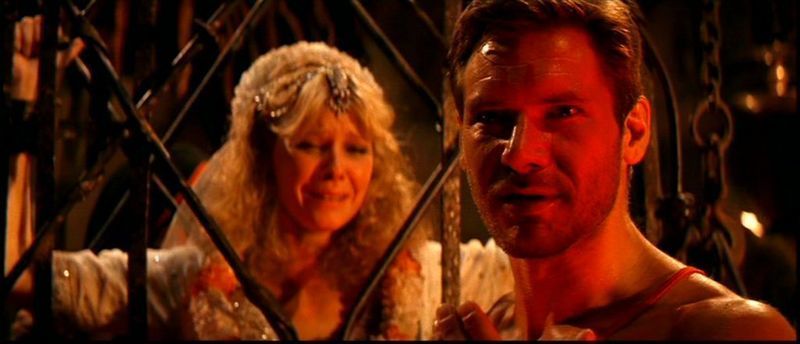
In “Indiana Jones and the Temple of Doom,” the darkest installment in the franchise, while on a mission to recover a sacred stone stolen from an Indian village, Dr. Jones is held captive in an Indian temple controlled by a bloodthirsty cult. The demonically dressed high priest forces Jones to drink from a skull a hypnotic potion. The elixir turns our once all-American hero into an abusive goon. A diabolical look floods across Ford’s face, and for the briefest of moments, the actor leverages his unimpeachable image for villainous intent. Take his possessed expression when he shackles his love interest Willie (Kate Capshaw) as a sacrificial tribute to the Hindu Goddess Kali Ma. When his young companion, the loyal and pugnacious Short Round (Jonathan Ke Quan), pleads for his help, Jones violently backhands him to the ground. His manic smile sneers upon the tearful boy. Though temporary, the ghoulish scene proved how Ford playing against his all-American image could be sharply effective.
The tactic further proved successful in the 1988 French neo-noir thriller “Frantic.” Ford plays Richard Walker, an upright citizen visiting Paris with his wife Sondra (Betty Buckley). Richard and Sondra’s trip to Paris is their first since their honeymoon. But their return to the city of love, leaving their daughter at home in San Francisco, isn’t for romance. Richard, a physician, is attending a medical conference. His only reason for inviting his wife, he admits, is knowing the chairman of the convention Maurice Alembert, who we never meet, will eventually ask about her whereabouts. What a dream.
Their Parisian excursion turns on a mistake: Sondra has the wrong suitcase. Her simple gaff not only instigates her kidnapping, but her husband’s paranoid midlife crisis. For example, when Richard cites an eyewitness’ story of seeing a man lead Sondra into a car, the hotel’s security staff member, and a US Consulate official—ineffective at best, incompetent at worst—ask him if Sondra has a secret lover in Paris. He later hunts down the hotel’s concierge—the last person to see his wife—only for the concierge to recount an attractive dark-skinned man accompanying Sondra. Each seedy detail from the concierge hits Richard like a bullwhip to the gut. A pained look washes over him. He sputters, stutters, and mumbles. His wife might have actually left him. Ford, who typically plays rugged romantics who never question their male pride, incisively portrays inadequacy. In this unique subversion for Ford, Richard is so inquisitive, yet so afraid. The stress and strain of a straight-edged man in too deep wracks him like a rusty razor across his face.
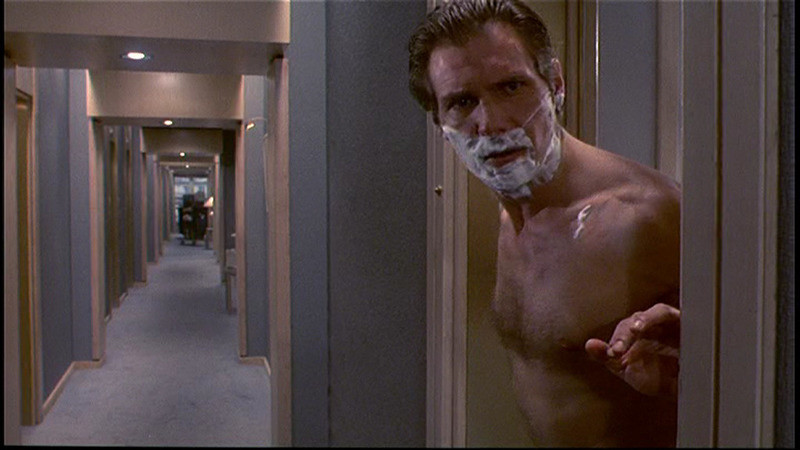
There’s also an awkwardness to this upright man, who out of necessity, becomes a kind of gumshoe in the city’s underworld. As Richard, the often stylish Ford unusually trounces around Paris in an ill-fitting grey suit. His inquiries lead him to a variety of Parisian subcultures, and in one scene, he even snorts coke, albeit accidentally. The straitlaced Richard soon meets Michelle (Emmanuelle Seigner), a striking mercenary courier tasked with bringing in a suitcase of unknown contents. In some movies, Ford might have angled for the younger woman (like in “Sabrina”). In “Frantic,” he does not. Instead, he ignores Michelle’s doe-eyed infatuations. But even with her swoonings, Michelle is the far savvier of the two. Consider her apartment. Whenever she forgets her keys, she nimbly traverses her building’s pitched rooftop to enter her apartment. But later, when Richard hears two Israeli men interrogating Michelle, he tries the same rooftop bit. The normally rugged Ford, who dodged a boulder as Indiana Jones, clumsily flails on the roof. Unlike the surprisingly athletic Dr. Richard Kimble in “The Fugitive,” in a deadly competition with Arab arms dealers, this Richard moves like a middle-aged man.
With regards to integrity, Richard is the archetypal Fordian hero forced to confront a world attacking his virtues. In “Air Force One,” the battle occurs between Ford’s president and terrorists. But in “Frantic,” the war isn’t with the Arab kidnappers, and it’s all internal. Richard and Michelle’s visit to a gangland discotheque exemplifies his paranoia. Michelle, dressed in an alluring red dress, snatches the doctor to the dance floor. And while Grace Jones’ off-kilter “Esta Cara Me Es Conocida (I’ve Seen that Face Before)” bops, Michelle seductively twists her hips into Richard. The upstanding husband—too inarticulate to physically reciprocate her allure—moves gangly. Of all the Parisian subcultures, the doctor is most fearful of its youth culture, worried of the drugs, lust, and violence it brings—incapable of escaping its insistent temptations. The youth culture emasculates him. It haunts him with paranoia regarding his age, unathleticism and his foreignness to lust. His pursuit to recover Sondra is more than a husband’s duty. She’s his ticket back to the safe comforts of his jetlagged, milquetoast life.
After “Frantic,” Ford went one step further in 1990. Alan J. Pakula—the director behind “All the President’s Men” and “Klute”—called upon Ford for his courtroom thriller “Presumed Innocent.” In this taut procedural, the action star plays State’s Attorney Rozat K. “Rusty” Sabich. Rusty lives with his family in a picturesque suburban home, and his wife Barbara (Bonnie Bedelia) drives their station wagon. She drives their son Nat to school, then drops her husband off at his morning ferry to work. From all outward appearances, this all-American family lives an idyllic life. But there are cracks.
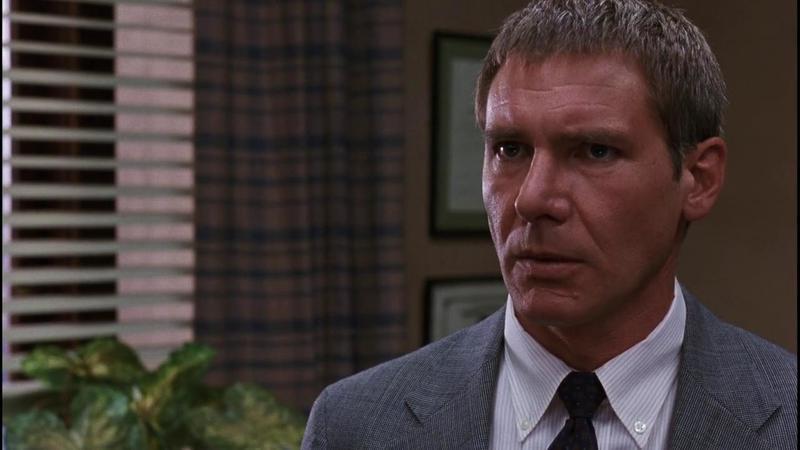
District Attorney Raymond Horgan (Brian Dennehy), Rusty’s boss, is up for reelection against Nico Della Guardia (Tom Mardirosian). If Nico defeats Raymond, Rusty might lose his job. The reality puts immense pressure on Rusty to get results. The law office he occupies is also toxic, and Rusty and Barbara are reeling from Rusty’s extramarital affair with an ambitious attorney named Carolyn Polhemus (Greta Scacchi). These conflicts collide when Carolyn is found tied-up, beaten and strangled, and raped in her apartment. The clues—from the motive of their aborted affair to his DNA evidence at her home—point toward Rusty’s guilt. For two-plus hours, Pakula offers few hints to either absolve or condemn the attorney.
A pragmatic man once driven by ideals, Rusty tells a newly hired Carolyn to avoid prosecuting rape cases. They’re a dead end for anyone with ambition, he frankly warns. When Carolyn approaches him to try a child abuse case, he coldly explains the unlikelihood of a conviction. Ford delivers these blunt appraisals taciturnly, and in a flat tone. This isn’t Det. John Book in “Witness” or Richard in “Frantic.” It’s closer to Han Solo in “A New Hope,” before his virtuous turn in “The Empire Strikes Back.” It’s a difficult performance because Ford must allow the viewer to believe him both capable of murder yet wholly innocent of such barbarity. “You always had the cork in too tight. When you blew, you blew,” observes Raymond.
He succeeds, in part, because of his posture. In the stiff way Rusty stands, and the emotion he doesn’t express. Rusty is so stoic, his few impassioned breaks hit like a gavel. When Barbara accuses him of still obsessing over Carolyn, even after her death, a broken Rusty cries: “It was never love. It was never love.” Through Rusty’s flashbacks to his affair with Carolyn, we learn the young female attorney held a longstanding interest in the hotshot prosecutor. She thinks Raymond might bequeath the District Attorney’s office to Rusty, thereby, putting her in line for succession. But Rusty is opposed to forcing Raymond’s hand, and Carolyn loses interest in him. Much like Richard in “Frantic,” the young woman emasculates the older Rusty. The once stoic prosecutor becomes sexually obsessed with her: He calls her home only to hang up. He begs for her affection at work. He even stalks her. She’s retapped his dormant passion. And he’s right, it’s not love. It’s a drug. And Ford plays desperate so well. With each languished plea, each puppy dog’s lament, Ford knows he’s not playing Indiana Jones. He’s more akin to the guide who betrayed him for the golden idol—willing to do whatever’s required for his trophy.
Pakula knows the power of Ford’s all-American archetype. He’s banking on it. We might, without any hesitation, believe Rusty is guilty if anyone but the bachelor from “Working Girl” played him. When Carolyn’s phone records prove Rusty’s persistent calling, we’re suspended. When the news of his fingerprints, and the fibers from his home are found at her apartment, we pause. When the blood from the crime scene matches his blood type, we fight our instincts. Pakula and Ford thrive in our hesitancy. They even twist the knife, like when Rusty and Jamie (Bradley Whitford)—part of the former’s defense team—search for evidence in Carolyn’s apartment. Jamie wonders why some crucial proof, the spermicide, isn’t present in her home. Rusty replies as though he’s the killer: “Well, you’ve got to remember, I wasn’t thinking very clearly. If I had been, I wouldn’t have left my fingerprints on the glass.” The first person obscures the boundaries between conjecture and recounting. Is Rusty merely offering a hypothetical or is he defending his actions? Ford knows this dark character isn’t Richard in “Frantic.” He’s clearly capable of murder. It’s part of the game.

During the ‘90s, Ford further established his on-screen heroes with Jack Ryan and President James Marshall. But if “Frantic” and “Presumed Innocent” offered hints of the tension wrought from Ford subverting his all-American image, then “What Lies Beneath,” a decade later, dives head first. In the Zemeckis film, Ford plays Dr. Norman Spencer, a scientist on the brink of a professional breakthrough. He occupies a picturesque seaside Vermont home with his adorable dog Cooper, his supportive wife Claire (Michelle Pfeiffer), and their college-bound daughter Caitlin (Katharine Towne). Norman and Claire, as with Ford’s other marital dynamics, on the surface, share a happy partnership. In fact, Claire literally worships her husband. She compares his brilliance to Madame Curie, and passionately caresses his pecs in bed. For his part, Norman might be the perfect husband: He’s loving, compassionate, and hardworking. The couple’s biggest issue, initially, is Claire’s empty nest syndrome, and the nagging emptiness of her life.
But their idyllic existence takes a turn. Their new neighbors, Mary (Miranda Otto) and Warren Feur (James Remar), openly bicker. An outside observer might intuit a toxic relationship. Claire then hears Mary sobbing on the opposite side of their fence. Days later, when Mary suddenly disappears, Claire begins to assume the worst. Her worries are deepened from unexplained occurrences in her home: a front door repeatedly and mysteriously left ajar, steamed messages written on her bathroom mirror, and the reflection of a woman in her bathtub. She comes to believe Mary’s restless ghost is seeking justice by haunting her. But her fears are simply a red herring for the real trouble plaguing her household.
Norman might match Ford’s prototypical everyman, but in actuality, just like Ford’s character in “The Mosquito Coast,” he shows classic signs of a narcissist. For instance, when Claire explains her theory Norman trivializes her: “Do you resent me for being busy?” Rather than listening to his wife, Norman sends her to a therapist. But his belittling continues. “You’re trying to sabotage me. You’re trying to hurt me somehow.” For those who don’t know, Mary isn’t dead. She merely left her husband as a brief respite (even so, her return doesn’t absolve their toxic relationship).
A year ago, Norman cheated on Claire with a student, Madison Elizabeth Frank (Amber Valletta). The revelation led Claire to wrap her car around a tree while doing 80 mph. Claire repressed the memories of that night, and never learned of Madison’s fate. For the first half of “What Lies Beneath,” we never suspect Norman of any wrongdoing beyond an affair. Though he might be named “Norman” in a nod to Mr. Bates, Ford’s character is charismatic in ways the creepy motel owner could never be. Such charm belies his danger. The actor’s built-in persona, an all-American hero, pulls a vicious veil over the audience. Heck, even in “Presumed Innocent,” as a deceptive cheater up for murder, he mostly told the truth. Such expectations wind up “What Lies Beneath.”
Consider Claire confronting Norman’s infidelity. First, to garner sympathy, he fakes his suicide. Then he begs her for forgiveness. In his plea, he sits opposite Claire. Ford’s face is beat red as tears well in his eyes. He modestly narrows his upper body, and with soft-spoken sheepishness asks for another chance. Beyond his phenomenal physical acting, a scene where he reduces his larger than life presence to the size of a flea, he knows, to the audience, he’s Harrison Ford. When has he ever lied to us? Later, when Norman describes finding Madison’s dead body, placing her in a car, rolling the car into a lake, we and Claire—for a split second—believe him.

Ford inverts all of his enchanting tools, the easy charm that made him a box office draw, and applies them to a murderer. He becomes a sociopath. The results are absolutely chilling.
After he drugs Claire and places her paralyzed body in the tub, for cover, he then calls Claire’s best friend Jody (Diana Scarwid) to report her missing. Norman opens the call with a stern voice then quickly alters to a fearful quiver. Much like Ford has banked on his trustworthy reputation to seduce the audience, Norman does the same to Jody. And as the water runs, and he kneels at the tub, he dispassionately watches the paralyzed Claire as a child waiting for the water to drain. As the water envelops Claire, Norman whispers, “Every time I look at [Caitlin], I’ll see you.” The delivery of that line, given with the same Indiana Jones half smile used to flirt with women, fully subverts his on-screen heroic reputation.
None of his subversive roles are by chance; Ford is keenly aware of his persona. In 2000, for the release of “What Lies Beneath,” he explained to the BBC, “I’ve always been aware of the potential to be trapped in the action genre because of the commercial success of the first films that I did. But I made every effort from the very beginning of my career to vary the kinds of genres and roles, to not only do that kind of film.” In the same interview, he confirmed the chance to play with audience expectations led to his pursuing Zemeckis’ film. Ford’s thoughtfulness, with regards to his roles, protected his career from shifting into autopilot. One of his lesser acknowledged virtues, his once creative adventurousness should be treasured. Even if, in the years since, it’s somewhat dimmed.
After “What Lies Beneath,” Ford upended his all-American image again by playing a Cold War Russian nuclear sub commander in Kathryn Bigelow’s suspenseful flick “K-19: The Widowmaker.” Much as I love his performance in this film—specifically his overplayed Russian accent—for his ardent audience, the film didn’t take. It was a financial disaster. Since then, he’s been reticent to gamble his heroic persona. Instead, over the last 20 years, he worked to recapture his magical archetypes in sequels to “Star Wars” and “Indiana Jones.” But for my money, by again subverting audience expectations, the actor still has the ability to channel a different, just as exciting, enchantment. He can still offer films as compelling as “The Mosquito Coast,” “Frantic,” “Presumed Innocent, “K-19: The Widowmaker,” and even “What Lies Beneath.” They represent the most curious undercurrent of his career—maybe the most risky. And damn if Han Solo doesn’t look good on the dark side.
